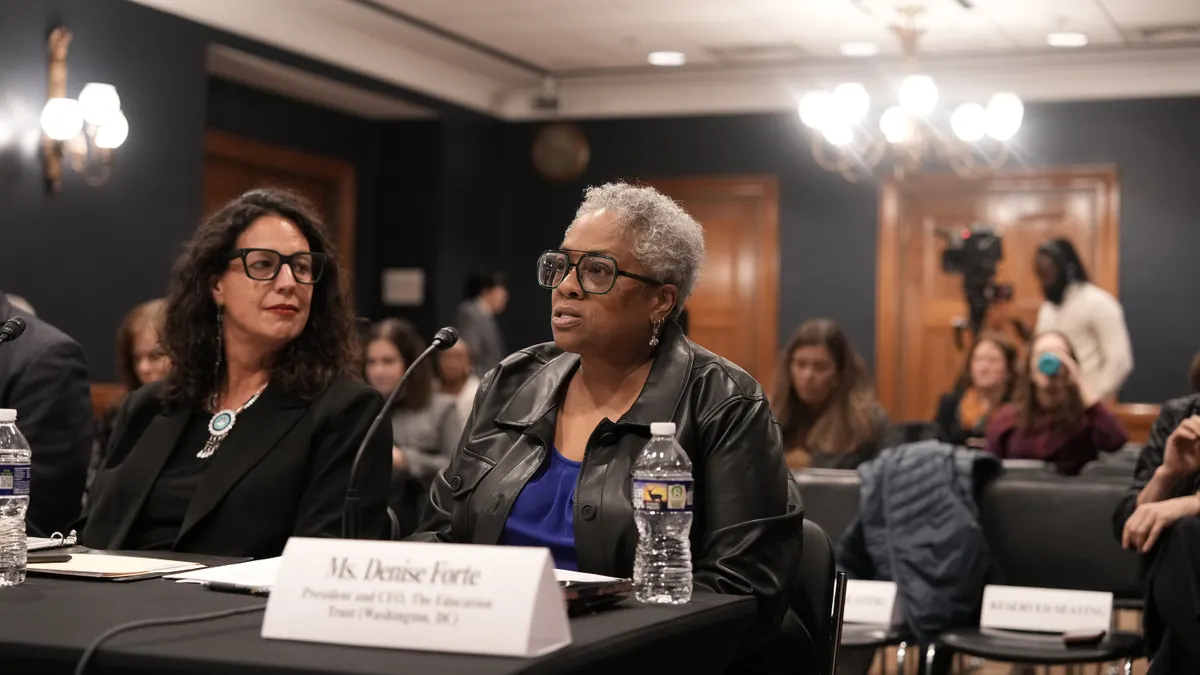Kathryn (Katie) Lash is executive director of the East Central Educational Service Center (ECESC) in Connersville, Indiana, and an adjunct faculty member at Indiana University East. Leigh Ann Putman is executive director of Metro RESA in Smyrna, Georgia. They are both members of the Institute for Education Innovation.
Call them what you will: Boards Of Cooperative Educational Services, Cooperative Educational Service Agency, Educational Service Center, Independent School District. States have district leadership that is sometimes mysterious or even unknown to many in the education space.
For the purpose of this article, we will refer to these entities as regional education service agencies, or RESAs.
Since RESAs typically operate in the background, there’s always the danger that we’ll be out of sight and out of mind. But service agencies are in an excellent position to do more than negotiate deals. We can play a pivotal role in helping district personnel, including superintendents, excel.
Metro RESA in Georgia’s Atlanta metropolitan area and East Central Educational Service Center in Connersville, Indiana, have become trusted resources among the educators we serve, thanks to these four tactics:
1. Building trust and making connections
Relationships and partnerships form the foundation for a service agency’s success. Building a wide network consisting of higher education institutions, government agencies, vendors and community partners enables RESA staff to leverage those connections to help K-12 educators.
For example, ECESC used its connections with community partners to increase districts’ access to tutors who could support post-pandemic learning recovery efforts. In addition, our partnerships with mental health agencies enabled districts to access mental health services via grants. The schools really appreciated that we were bringing solutions to them so they did not have to figure things out in isolation.
To help district administrators reach across district borders and learn from each other, Metro RESA hosts events we call “Job Alikes.” These events are consortium meetings that connect educators in similar roles. So, we have Job Alike meetings for curriculum directors, school safety directors, finance directors, etc.
Administrators are so busy that they can inadvertently become siloed away in their districts, and it’s helpful for them to hear what their peers are doing or thinking during these meetings.
2. Seizing less obvious opportunities to create needed resources
Staying aware of the needs and occurrences in schools and their surrounding communities allows RESAs to quickly seize opportunities to provide support.
While probably best known for professional development, RESAs across the country vary widely and provide many services essential to school operations. Procurement purchasing can range from ed tech to copy paper to food bidding and buses. Consortiums for health, property and liability insurance also bring value.
But broadly speaking, innovation is at the core of our existence. For example, ECESC has used pandemic funding to create a career exploration trailer that can be driven to the schools in our service area. Service centers have always supported schools’ efforts to help students consider career options, but this mobile resource provides practical, hands-on activities directly related to our region’s top-demand industries, e.g., a welding simulator, coding activities, a phlebotomy arm and CPR activities.
To serve as a resource during that immensely stressful time, Metro RESA hosted a weekly Zoom call just for superintendents. They talked about whatever subjects were on their minds, from ideas and data around schools reopening to what to do about extracurricular activities and sports seasons. It brought that group of 12 superintendents together like never before.
3. Serving as a support for the state department of education
In addition to connecting educators with resources and each other, RESAs’ networks can create connections for state agencies and state-level initiatives.
For example, since ECESC’s network includes representatives in the Indiana Department of Education, they include us in their communications about goals or standards coming down the pike. We can then ensure that information has reached our districts in a very timely manner.
In Georgia, the governor has given high priority to the educator pipeline, so recruitment and retention are a big focus for Metro RESA. We have a job-embedded program called iLEAD that’s proven to be a very popular alternative certification route for school leaders, and Georgia Teacher Academy for Preparation and Pedagogy (GaTAPP) provides an alternative route to certification for teachers.
4. Hiring “people” people
None of the efforts described above would be possible if our RESAs did not have the trust of the individuals and institutions that make up our networks. We hire staff members who are not only skilled in professional development and their other duties but also excel as connectors and are “people” people. Relationships are at the heart of all we do.
When RESAs foster innovation and build strong teams, it creates a ripple effect that benefits district administrators, teachers and, of course, students. Our experiences have proven that service agencies do not have to be resigned to being in the background, and with creative ideas and leadership, we come to the fore and provide even more value to the areas we serve.

















